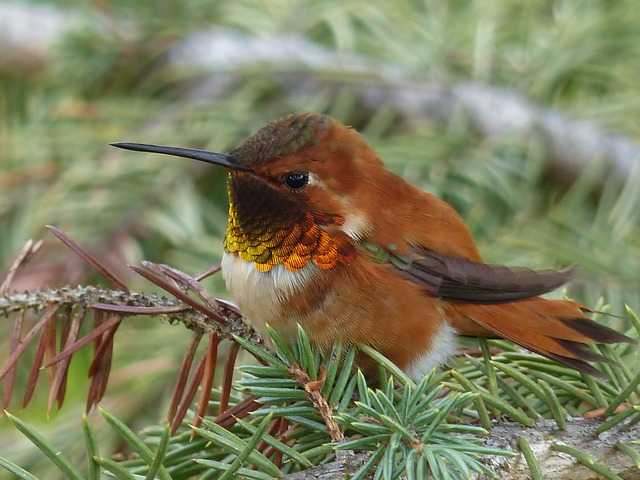Baby hummingbirds are stunning little creatures. However, we do not get to see much of them as they are bundled up in their nests most of the time.
This limited interaction with baby hummingbirds leaves us with a lot to imagine about their habits, routines, and overall lives. One of the questions that arise is that if baby hummingbirds don’t leave their nests, what do they survive on? What do they eat?

Quick Answer
Baby hummingbirds drink nectar, and in addition, they need different sources of nutrients to grow and remain healthy. They get sufficient protein, vitamins, and minerals by eating small bugs and insects. Some insects that baby hummingbirds eat are flies, beetles, bees, mosquitoes, wasps, caterpillars, insect eggs, and tiny spiders.
Now that you know about baby hummingbirds’ food sources. Please continue reading to learn more about their diet and eating patterns in detail.
What Does Baby Hummingbirds’ Diet Consist Of?
Baby hummingbirds survive on a diet of nectar and bugs. But, they only eat small insects as they have smaller beaks. Let’s take a look at the specific things baby hummingbirds have in their diet:
Nectar
They drink fruit juice from ripe fruits such as pears, berries, oranges, and apples, and flowers such as lupines, petunias, and daylilies provide them with sweet nectar.
Beetles
Beetles are extremely common and readily available, especially in the winters. The most common type of beetles that baby hummingbirds feed on are tiger beetles, stag beetles, carpet beetles, ground beetles, etc.
Spiders
Tiny spiders can be seen in a baby hummingbird’s meal quite often. Some of the most common spiders that baby hummingbirds eat are grass spiders, ant spiders, wolf spiders, etc.
Mosquitoes
Mosquitoes are a very common food source in a baby hummingbird’s diet, especially in summers when there is an increase in the mosquito population.
Caterpillars
Caterpillars are tiny mushy insects and are a great source of nutrients for baby hummingbirds. They are found in grass and leaves of plants, hedges, and trees.
Flies
Houseflies and fruit flies are everywhere, making them an easy catch for hummingbirds to incorporate into their diet.
Wasps
Wasps are small insects with more than 1000 species. Some of the most common wasps that baby hummingbirds eat are spider wasps, paper wasps, yellow jackets, etc.
How Do Baby Hummingbirds Eat?
After learning the kind of food baby hummingbirds have, you must be wondering why we don’t see them at hummingbirds’ feeders and how these tiny creatures eat all these bugs and insects. Well, we know that babies function differently than grown adults. Similarly, hummingbirds are no different.
The baby hummingbirds cannot eat by themselves, and here comes the mother hummingbird’s job, which is not an easy task. The mother leaves the nest several times a day to search for food for her hatchlings. She stores nectar and small insects in her beak and breaks the food down in a mixture so the baby can easily digest it. Then, the mother inserts her beak into babies’ mouths and pumps food into it.
How Often Do Baby Hummingbirds Eat?
Baby hummingbirds need to eat approximately every 15-20 minutes. The mother feeds the babies at least thrice in an hour most of the time. If they are not fed properly, they will become weak and poorly or die.
Do Baby Hummingbirds Eat At Night?
Hummingbirds and their babies stop eating at night, right before sunset, as their metabolism rates slow down and start to decline. Sometimes, the mother does feed the babies at night, but only if any artificial light is present.
Do Baby Hummingbirds Drink Water?
Just like adult hummingbirds, a baby hummingbird does not need water either. For drink, that is. They might need water for other things when they are grown. The flower and fruit nectar they drink adequately meets their hydration requirements.
When Do Baby Hummingbirds Start Eating On Their Own?
A baby hummingbird leaves its nest at 3-4 weeks old when they are ready to fly. Even after that, the mother occasionally feeds them. When they are 5 weeks old, they start eating on their own properly as fully grown hummingbirds.
How Can I Feed A Baby Hummingbird?
As we have learned that the mother feeds the baby hummingbirds, you can hang a hummingbird feeder in your garden to make it easier for the mother to find food.
Or, if you find a baby hummingbird out of its nest, the first thing you should do is try to return the baby to the nest. However, if it’s an abandoned baby, you can try to feed it. And if that is something not possible for you, take the baby bird to an animal rehabilitation or rescue center.
If you plan to feed the hummingbird baby yourself, know that it requires plenty of time and patience, and with that in mind, here’s what you should do:
Feed them a mixture of sugar and water initially through a syringe or eyedropper. Make sure you feed the baby bird 4 to 5 drops every 30 minutes.
After the first day, make some nutritious meals for the baby hummingbird by adding some birdfeed, mealworms, and milk powder into the sugar and water mixture. Make sure the food you add is squeezed, smashed, and blended because if the food is in big lumps, the baby hummingbird will not be able to digest it. You need to feed them three or four times or often as needed, just like a mother hummingbird would.
Wrap Up
Baby hummingbirds drink nectar, but just like us, they need additional nutrition to grow, which they cannot get from just sap and nectar. Hence, they eat small, soft-bodied bugs and insects like spiders, mosquitoes, beetles, etc. Their mother feeds them by regurgitating the food in their mouths.
Now you know what baby hummingbirds eat and how they eat, so feel free to hang a hummingbird feeder with ripe fruits and attractive flowers in your backyard.